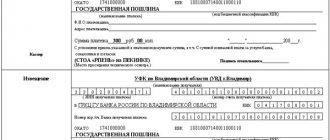Ask a lawyer
faster.
It's free! Free legal consultation Moscow and Moscow region: +7 499 938-93-12 St. Petersburg and region: +7 812 467-39-73 Fed.
number: 8 800 350-73-54 CONSULTATIONS CONDUCTED: today - 21, per month - 687, per year - 11,345
From January 1, 2019, such a service as garbage collection and removal moved from the residential category to the utility category. A new line “Management of solid waste” has appeared in receipts for housing and communal services. Such innovations are part of the “garbage” reform, the purpose of which is to systematize solid waste management. But the amounts indicated in the bills raise many questions among residents. Moreover, receipts are sent even to owners of plots where there are no buildings at all. In this regard, it is worth finding out how tariffs are formed and how they can be challenged.
Peculiarities of charging for solid waste removal
The responsibility for organizing the removal and disposal of waste is assigned to regional operators. These are special organizations that collect waste, sort and process it, and then transport it to landfills.
It is assumed that residents will have to throw away different types of solid waste in multi-colored containers. There will be gray containers for organic and household waste, and blue containers for dry waste (glass, plastic, paper). Vehicles of different colors should also remove waste. But so far new containers have not appeared everywhere, but the fee for the service has increased.
Tariffs for the removal of solid waste are determined by regional operators with the participation of local authorities. They can be calculated based on the number of residents or the area of the apartment. Each region has the right to independently choose a convenient option
The cost of such work in different regions of the Federation differs significantly. Thus, regional operators in Voronezh price their services at 165 rubles. per person. The most humane prices are set for residents of the North Caucasus: in Dagestan, garbage removal costs 29 rubles. Current tariffs for a specific region are indicated on the websites of local administrations.
The cost of the service, which residents see on the receipt, includes both collection, transportation and destruction of waste, as well as related expenses. These include administration of activities, gasoline costs, vehicle maintenance, and staff salaries.
Also, according to the authors of the “garbage” reform, the current tariffs include the construction of waste processing enterprises, the destruction of unauthorized landfills, and environmental protection. True, there are still no fewer landfills. It is also unclear who will clear them, but they carefully take money from the residents.
You can calculate the tariff for waste removal using the following formula:
A x (B/C) x D, where each letter means the following:
- A – the number of people living in the apartment temporarily or permanently, or the area of the property.
- B – waste accumulation standard for the year.
- C – number of months in a year (12).
- D – price of the service.
If residents leave the premises for 5 days or more, they can apply for a recalculation. Documents confirming long-term absence are attached to it (for example, a certificate of hospital treatment or tickets with which the tenant went on vacation).
You must also apply for recalculation if there are errors in the receipt (for example, bills are issued for three people, but two people already live in the apartment). In confirmation, you will have to provide a certificate of the number of residents.
Garbage Removal Law
Presence of penalties for failure to recycle
Municipal solid waste refers to those elements that, according to Article 1 of the Waste Law, appear during the life of individuals. These are also things with goods that have lost their useful consumer qualities when people satisfy certain needs. If we consider only the legislative aspect, each person pays only for the waste that is generated when satisfying household needs. Payment is made for the removal and disposal of solid municipal, garden or household waste from the site.
Removal and disposal must follow the procedure prescribed by law. It is not uncommon for one type of waste to be disposed of and another to be buried away from the public. The third is completely processed in a hot shop, creating new materials. Due to non-compliance with the prescribed requirements in the field of ecology and epidemiology for the collection, sweeping, accumulation, use, disposal, transportation, disposal and other handling of waste, a fine is imposed.
Fines begin to arrive both for the lack of waste removal and for their illegal disposal under Federal Law No. 89. Its volume depends on the status of the person and his actions. For example, the scope of the sanction increases if a legal entity acts outside the law.
Note! A waste removal agreement is a mandatory document that a housing and communal service must conclude with a third-party organization in order to comply with the norms prescribed by law. This is a bilateral contract, interaction between the contractor and the customer for the provision of waste transportation services. Private sector waste is collected by a company that then disposes of it.
If they do not have such a document, people are liable in the form of a fine from one thousand to several thousand rubles under Article 8.2 of the Code of Administrative Offences. In addition, the authorities independently establish the administrative type of responsibility. For example, according to Article 6.21, failure to have an agreement leads to a fine of five thousand rubles. As a rule, individuals pay a sanction in the amount of 1-2 thousand rubles. Legal entities pay a fine in the amount of 150-200 thousand rubles.
The procedure for challenging tariffs for solid waste removal
If the operator inflates tariffs for waste transportation, as well as other violations of the law, residents have to defend their rights. The first step is to inform local authorities that the operator is violating the terms of the agreement. The claim must be sent to the authority that signed the agreement with the operator.
To find out who exactly concluded it, just go to the website of the service provider. The texts of agreements are almost always published there. In most cases, the counterparty is the relevant housing and communal services department.
In addition, residents can complain to the following authorities:
- Regional Energy Commission. The competence of its employees is to consider complaints about the incorrect formation of various tariffs.
- Federal Antimonopoly Service. When preparing a claim sent to this body, it is necessary to correctly and in detail state the reason for the appeal.
- Rospotrebnadzor. Contacting this service is also an effective way to influence violators.
If there are no results, tenants have the right to contact the prosecutor's office or file a claim in court.
Changes for 2020
In 2020, a new program regarding waste collection and disposal was launched. Due to the deteriorating environmental situation, in December 2020, the highest legislative body of Russia introduced amendments to the law “On Production and Consumption Waste”, dated 1998.
The updated law assumes:
- responsibility of local authorities for the formation of landfills and the selection of an operator company;
- charging for transportation, depending on waste accumulation standards per person, and not based on the area of housing;
- the establishment of standards by local governments, and tariffs by the state committee;
- an increase in benefits in the amount of up to 50%, but not more, of payment, when participating in programs for the distribution of waste into non-food and food;
- allocation of payment for garbage removal to a separate line of the receipt.
The cost of waste removal services is determined by two parameters - the standard for the accumulation of solid waste per person and the tariff. The tariff is set depending on:
- waste collection and sorting;
- distances to the processing site;
- fuel prices in the region;
- neutralization;
- waste disposal;
- specific climatic conditions;
- servicing contracts with waste producers.
Is it possible not to pay for garbage removal in a private or apartment building?
In accordance with the law, garbage collection services are provided to different categories of consumers: residents of private houses and apartments located in high-rise buildings, legal entities, owners of houses located in garden associations. All of them are required to promptly pay for the services of regional operators. Even if the consumer does not want to spend money on solid waste removal, a standard contract will be drawn up without it.
Penalties are applied to debtors for evading payment of bills. If the debt period exceeds 2 months, penalties begin to accrue. In case of long delays (six months or more), the executor has the right to go to court, and the funds will be forcibly recovered with the help of bailiffs.
Garbage removal is a public service or housing service.
Utility service
At the moment, the legislation clearly establishes the fact that waste removal is strictly a public service. Therefore, this service has been removed from the housing service. It is worth noting that if before 2020, responsibility for the collection and removal of accumulated household waste fell only on representatives of the management company, now responsibility also falls on users.
According to the Criminal Code of the Russian Federation, residents of an apartment building must enter into an agreement specifying the list of waste to be removed, the moment of installation of containers and their maintenance in order. There should also be a provision for cleaning up waste sites.
The operator undertakes under the contract to remove waste according to an established schedule, completely recycle the waste, sort it in an industrial environment and send some for scrap and some for recycling.
The conclusion of the document is possible with any company that operates in this field of activity under competition law. Sometimes there are situations when housing and communal services work with only one organization and this is an illegal activity. But ordinary people cannot make a ban. Since 2020, a competition has been held to select a collecting, processing and recycling organization. She will work with the owners for ten years while the document is in force.
The peculiarities are that waste can simply be taken to a landfill, or can also be disposed of. This document has a simple written form in several copies. The subject of the agreement is household waste with construction, medical, industrial and expired waste, the transportation of which can be done to places of safety.
Important! The standard estimate contains the subject matter and terms of the tariff agreement, the responsibilities and obligations of the parties to the plan, the payment procedure, additional conditions with details and the cost of work on removing waste collected by the cleaner. Thus, information about the service, terms of work, conditions for waste removal, obligations, payment procedures, conditions of liability, explanations of clauses of the contract, secondary information and actual and legal address are written down. Information about the bank details of the parties is also indicated.
The owner must ensure the management of MSW
Clause 148.36 of RF PP No. 354 outlines the rules for calculating the volume of utility services for the management of solid waste for the case when there are no permanent or temporary residents in the apartment.
According to Part 5 of Art. 30 of the Housing Code of the Russian Federation, the owner of a residential building or part of it must ensure the management of solid municipal waste, that is, its transportation, neutralization and burial. To do this, he enters into an agreement with the regional operator.
Since it is impossible to determine the volume of individual consumption of the MSW management service, the fee for it is calculated according to the number of permanent and temporary consumers living in the residential premises. If there is no information about such persons, then - according to the number of owners of residential premises.
Who is responsible
If before 2020, responsibility for waste removal fell solely on the management company, now it is divided. The management company is responsible for:
- conclusion of an agreement with a regional operator, in accordance with the Decree of the Government of the Russian Federation;
- providing residents with a list of waste for distribution into different containers if an appropriate decision is made;
- installing containers and keeping them clean. Cleaning waste collection areas.
Material on topic! How and where to find out the financial and personal account required to pay for utilities.
The regional operator is responsible for other operations:
- waste removal according to schedule;
- the entire waste treatment process.
Residents of private houses enter into agreements with operators independently. The standard form of the agreement is established by the law “On the management of municipal solid waste...”.
The operator is selected at the regional level through a competition. The contract period is 10 years.
For information about the distribution of responsibility and what the tariff is made up of, watch the video:
Save and share information on social networks:
Recently, you can find a lot of information on the Internet about a sharp increase in garbage collection tariffs for both residents of apartment buildings and private homeowners, as well as those living in rural areas. Many media outlets report that fees for solid waste removal have increased hundreds of times, thereby generating heated discussions among netizens. In this article, we will figure out what innovations have come to the sludge since January 2019 and how much we will have to pay for garbage.





